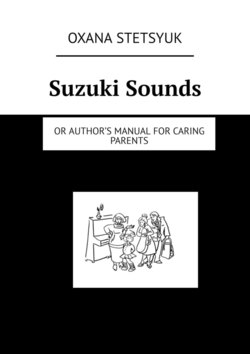Читать книгу Suzuki Sounds. Or author’s manual for caring parents - Oxana Stetsyuk - Страница 2
Introduction
Оглавление“Man is a son of his environment”
Shinichi Suzuki1
Talent is an amazing and marvelous phenomenon. All mothers in the world want their children to become successful! And talent allows you to stand out from the crowd. But to have talent or ability is only part of the Big Prize! And for true success, you still need the right environment and luck. We are all different, and each of us is talented in our own way. Unfortunately, not everyone manages to demonstrate their abilities in life. And throughout their whole life a person can think that they were born without any special abilities.
But Dr. Suzuki found a simple yet brilliant way to expose talent in every child. His method is also called the “Native Language Method”. From a very young age children learn to play musical instruments as naturally as they learn to speak their native language. After all, music is also a language. And all children, sooner or later, learn to speak their mother’s language, no matter how difficult it is. This is facilitated by life itself: the child is surrounded by close people who speak their native language, feels protected, constantly listens and imitates. That’s all!
“Talent is no accident of birth”, “Talent is not inborn, it has to be created”2 —was these statements are the essence of the wonderful method of the great Japanese teacher-musician. Every child can learn to play musical instruments, just as they can walk, talk and read. It all depends on the people with whom they are surrounded by. And if the child’s abilities were not developed at the most suitable time for this – from 0 to 5 years, then you shouldn’t settle for this for the future. It is necessary to work on yourself and achieve more!
Music is still one of the most proven ways to develop children. This method has not changed! This art is understandable to every person: it inspires people to create poems, novels, paintings and sculptures. Many scientific discoveries that became a breakthrough in the history of mankind would not have happened without musical art! We have heard scientists’ names who were outstanding musicians: chemists Alexander Butlerov and Alexander Borodin, physicists Jacob Frenkel and Max Planck, constructor Lev Termin and many others.
“Music and research in the field of physics are different in origin, but are interconnected by a unity of purpose – the desire to express the unknown.” These words belong to the great scientist and violinist Albert Einstein3. As they say, no comment! Numerous modern scientific studies have proven that playing music seriously affects the human brain. Mathematical abilities and speech are developed, thought processes are activated, and short-term memory and intuition are improved.
All of the above, in addition to standard skills are: the development of hearing and voice, movement coordination and auditory perception. But this “useful” list does not end there. Under the influence of playing music, the psycho-emotional state improves, memory disorders, Alzheimer’s disease, insomnia are treated, and patients are rehabilitated after strokes and craniocerebral injuries. A truly amazing, unique mechanism is right in our hands!
Why then do we so rarely witness positive results in children who diligently attend music schools? And why do many children, having received such an education, do not then touch their instruments, do not play music for their pleasure? Why is teaching children a fine art sometimes becomes not due to, but contrary to? Probably because this system works too selectively and is not intended for everyone. It is great for discovering and nurturing rare natural talents. But now, time and children have changed. And we began to seek for other techniques.
I, as a teacher who has worked in the children’s music school for more than 10 years, am well acquainted with this “offensive” situation for the teacher. And I have also asked myself many questions:
– Why do children get so tired of school so quickly?
– Why do they learn from under the parental “stick”?
– Why do creativity and freedom disappear from music lessons?
I searched and tried various systems in working with children and unexpectedly stumbled upon the technique of Japanese violinist-teacher, Shinichi Suzuki. My soul immediately responded!
The method turned out to be far from new, but it has long been tried and tested in many countries over the world, from the 1950s.
1
Shinichi Suzuki, “Nurtured by Love: The Classic Approach to Talent Education”, ISBN 0874875846, p 26
2
Shinichi Suzuki “Nurtured by Love”, p 4
3
Einstein A. Collected scientific works. M., Science, 1975
